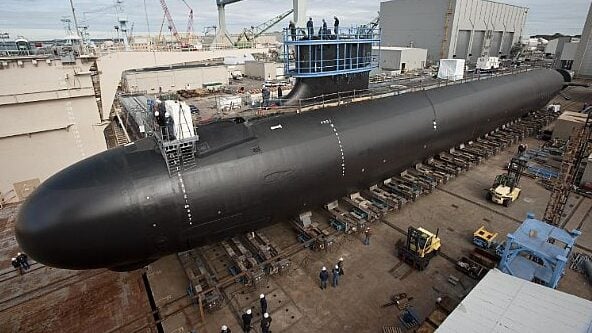
Virginia-class submarine USS Minnesota under construction in Newport News. US Navy photo by Chris Oxley
HONOLULU – A new report calls on the Biden Administration to grant Australia a blanket exemption from export restrictions known as ITAR, in order to remove a major obstacle that threatens the AUKUS military technology agreement.
“AUKUS represents a generational opportunity for Australia, the United Kingdom and the United States to deepen cooperation in defense industrial integration and technology development.” the report, from the Center for American Studies at the University of Sydney, says. “However, within the US system, antiquated legal and regulatory environments and a mindset that discounts the value of allied input in collective strategies threaten the realization of the AUKUS agenda to its fullest potential.”
Australia, the United Kingdom and the United States have committed major diplomatic and financial capital to build nuclear-powered attack submarines, known as Pillar I of the AUKUS agreement. Co-authors Bill Greenwalt, a leading US arms export expert, and Tom Corben, a fellow at the center, argue that Australia’s ITAR restrictions pose a threat to both this effort and Pillar II , which includes research and development work on quantum computing, cybernetics, underwater drones and other advanced technologies.
The authors call for a two-pronged approach to removing ITAR restrictions, starting with the executive order to speed things up and then having Congress cement those authorities into law.
Congress ranks second because, while powerful lawmakers already support changes to the law, the Hill often balks when faced with the prospect of “relaxing” gun export laws. After all, no member of Congress wants to be blamed for “donating” technology to a competitor like China or Russia. Therefore, significant export reform may take several years to happen. In the run-up to a presidential election, with numerous other important issues to deal with, it would be especially difficult.
“As work quietly begins on Pillar I… there is an obvious risk that any progress towards establishing the optimal legal and regulatory conditions for AUKUS, particularly Pillar II, to function as intended expected,” the report says. The executive order and subsequent legislation “are essential to achieving the nature and scale of US export control reforms needed to make AUKUS a reality. Without them, the chances of failure are uncomfortably high.”
As an example of how ITAR may affect the non-nuclear underwater parts of AUKUS, the authors point to the Australian Guided Weapons and Explosive Ordnance (GWEO) company, which is aiming to rapidly expand Australia’s domestic munitions manufacturing to the light of the massive expenditure of ammunition during the Russian invasion of Ukraine. That effort is likely to take years to get off the ground because two U.S. companies were chosen to lead it, the report said.
“In contrast, European ammunition manufacturers have recently secured agreements with the Australian government to manufacture precision anti-bush ammunition locally, including through technology transfer programs, and estimate that local production lines could be established within much shorter than the previous ones”. says the report.
There is energy when working on the ITAR topic in happiness for AUKUS. Rep. Joe Courtney, D-Conn., one of the leading voices in Congress on sea power, has advocated for an ITAR exemption for Australia. And the House of Representatives passed a bill in March requiring the State Department and the Pentagon to provide lawmakers with information on the approvals needed for Australia to get its nuclear ships.
Still, as Courtney wrote in an op-ed for Breaking Defense earlier this year, more work needs to be done: “We can’t sit around waiting for problems to appear; now is the time for my col leagues from the US and our international partners to overcome these challenges.”
recommended
[ad_2]
Source link





